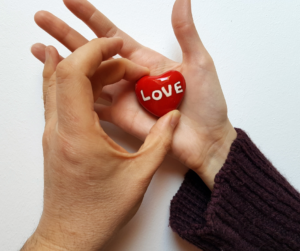
You’ve probably heard the word attachment and you know that is has something to do with connection. Attachment style is a concept that therapists directly or indirectly often bring into therapy.
What is attachment style? I describe it as the organized survival system that we create (most of the time unconsciously) to navigate relationships. In the past, we needed a “tribe” to survive when we lived in the “wild”. That tribe helped us feel safe in numbers, helped us forage for food, would sound an alarm around a predator. Our brains over time in evolution became wired to make sure that we maintained our tribe to survive, thus creating a survival system to maintain our relationships.
You know how your spouse or significant other tends to…shut down….and you know how you may respond by continuing to ask why as your anxiety increases or continue to repeat yourself but nothing gets through? Or maybe your spouse is the one who requires lots of emotional reassurance and you’re stuck wondering “why is he even questioning that?”.
Connection, love, and belonging makes us feel secure and at ease. It is adaptable. When something threatens that security, our survival systems kick in. There are deeply ingrained relational survival systems that create your relationship’s attachment style “dance” with the other person. I use the word the dance because ultimately it comes down to different moments of connection and disconnection, sync and out of sync.
Decades of research has found that there are 4 types of attachment styles and they have their child and adult equivalents. One of them is Secure (healthy) and the other three are Insecure (distressing). There are also many different names in the literature for each, but I will address the most commonly used terms.
- Secure Attachment
- Anxious Attachment/Preoccupied attachment
- Avoidant Attachment/Dismissive attachment
- Disorganized attachment
One of my favorite podcasts that covers attachment styles, Therapist Uncensored, describes each in a simplistic small snippet (although there is much more to learn about each)…
“Avoidant/Dismissive is a kind of organized insecurity that deactivates and by-passes distress. While here, we unconsciously need attachment, but we often do not perceive or have difficulty expressing the need or desire for others. [You will hear often…]‘Pull yourself up by your bootstraps, I’ll give you something to cry about, Lone Ranger…’
Anxious/Preoccupied attachment is a kind of organized insecurity where we have difficulty calming down after reaching distress. We are afraid of loss or abandonment – those who identify here can misread negativity into interactions and respond accordingly.
There is also another category from the research, called disorganized insecurity. This kind of insecurity has most to do with loss and trauma. This is healable and the brain and body can recover by working through whatever the trauma or loss may be.
A part of us is always able to relate in the optimal level and we can keep gaining insight and creating connections so we can deepen and grow the best part of ourselves.”
Why is it important to know my attachment style?
Attachment styles are initially formed with our caregivers/parents during our early years of infancy. Attachment style is dependent upon the caregiver’s parenting style and responsiveness to their children. The relationship with our caregiver(s) serve as the “prototype” in which we learn how to be and act in a relationship. We often carry the same defenses and ways of connecting throughout our life in future relationships with others. It is important to be self-aware of what our patterns are so that we can better acknowledge things we have learned that are potentially negatively affecting our interactions and what strategies we can learn to improve our relationships. Most strategies target how to develop a secure attachment with others. The goal is not to have one hundred percent secure attachment with others all the time, because we are all human and make mistakes, but to have the secure attachment style be the predominant style that characterizes the relationship. Therapy can help you with this.
To learn more, here are some recommendations for further reading or study on attachment:
Wired for Love by Stan Tatkin – book
Therapist Uncensored-Podcast– Episodes 5, 6, 31, 37, 54, 56, 59, 60, 61
Youtube: Relationships are hard. But WHY?
Call to make an initial consultation with me at 512-643-5440.
